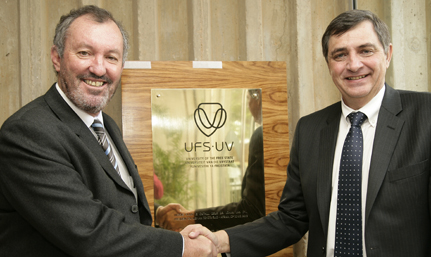Latest News Archive
Please select Category, Year, and then Month to display items
07 January 2018
Photo Charl Devenish
 Dr Anneke van der Spoel van Dijk is invested in contributing
to the global effort of stopping TB by 2035.
Dr Anneke van der Spoel van Dijk is invested in contributing
to the global effort of stopping TB by 2035.
The work of Dr Anneke van der Spoel van Dijk investigates the spread of TB in the Free State population using techniques such as next generation sequencing, spoligotyping and MIRU-VNTR typing. Dr Van der Spoel van Dijk, a senior medical scientist in the Department of Medical Microbiology at the University of the Free State (UFS) also looks at drug resistance in her research. This work informs decisions about how best to treat patients with multidrug-resistant TB (MDR-TB).
She employs rapid molecular techniques to track one of Africa’s most serious diseases, tuberculosis (TB).
Drug resistance
Scientists assist the National Health Laboratory Service and Department of Health in trying to refine the diagnostic tools to identify these cases earlier. Dr Van der Spoel van Dijk explains: “Until recently, it took up to two years to fine-tune treatment decisions for patients with MDR-TB. Patients get a cocktail of anti-TB drugs, but it takes time to find the right combination. Re-infection and relapse (patients stopping treatment for several reasons) add to the diagnostic and treatment management challenges.
Enormous impact
“Now doctors can reduce the time needed for diagnostic certainty to about seven days, while new drugs allow reduction of treatment from more than 18 to nine months. This can have an enormous impact on the life of many patients.”
Dr Van der Spoel van Dijk’s work forms part of research in the faculty looking at resistance development in TB strains. She is currently also doing her doctoral thesis on the differences and incidence of MDR-TB among adolescents versus adults. Dr Van der Spoel van Dijk says: “It is a complicated picture, but we hope to unravel it to support better diagnostic tools and patient care.”
As part of the National Health Laboratory Service, her department is playing an important role in TB diagnostics and the training of scientists and future pathologists. “Our work is contributing to the global vision to stop TB by 2035,” Dr Van der Spoel van Dijk says.
New Albert Wessels Auditorium officially unveiled
2013-05-19
|
 |
Dr Johan van Zyl (President and Chief Executive Officer (CEO) of Toyota South Africa and CEO for Toyota Africa) and Judge Ian van der Merwe (Chairperson of the UFS Council) unveil the redesigned Albert Wessels Auditorium.
Photo: Johan Roux
20 May 2013 |
The swanky new interior and entrance of the Albert Wessels Auditorium WA) were officially unveiled on Bloemfontein Campus of the University of the Free State (UFS) on Friday 10 May 2013.
Prof Jonathan Jansen, UFS Vice-Chancellor and Rector, and Judge Ian van der Merwe, Chairperson of the UFS Council, presided over the AWA unveiling ceremony. They were joined by a special guest, whose company has a long affiliation with the UFS and the AWA in particular.
Dr Johan van Zyl, the current President and Chief Executive Officer (CEO) of Toyota South Africa and CEO for Toyota Africa, unveiled the commemorative plaque at the new entrance. Dr Van Zyl reaffirmed the relationship between Toyota South Africa and the UFS, which can be traced back to the founder of his company.
The namesake of the AWO was the founder of Toyota South Africa. Dr Wessels was at one time married to Elizabeth Eybers, the acclaimed poet who won the Hertzog Prize in 1934 and 1971. Could she have inspired Wessels’ love of the arts? Regardless, the AWA will serve as a world-class facility for the arts, corporate meetings and seminars, from now on. The AWA can now seat 196 people on its luxurious red leather seats.